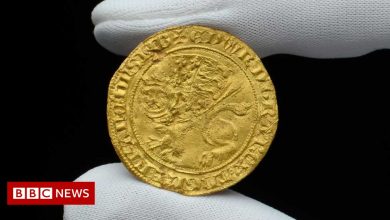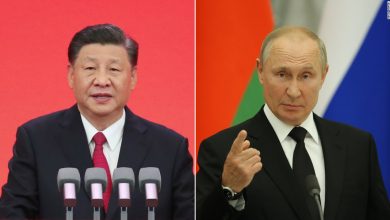Russia’s Default Swaps Signal $40 Billion Payday Is Imminent

(Bloomberg) — If the swap market is to be believed, Russia is going to default on foreign debt, and insurance is going to pay out.
Most Read from Bloomberg
Trading on credit-default swaps, used to insure against non-payment, has skyrocketed this week despite the myriad of questions over whether Russia’s plan to repay some foreign bondholders in rubles could ultimately be judged as a default. There are even concerns that international sanctions and existing bond terms could complicate any settlement of the $39.7 billion of outstanding contracts.
And yet, the swaps suggest a record 71% chance of default within one year and 81% within five years, according to ICE Data Services. It costs $5.8 million upfront and $100,000 annually to insure $10 million of Russia’s debt for one year. That compares with about $3.8 million in advance last week up from just $300,000 annually — about 300 basis points — before Russia’s invasion of Ukraine. Credit-default swaps switch to upfront pricing when perceptions of default are imminent.
“The market is now signaling loudly that they believe Russia’s CDS will work,” said Jochen Felsenheimer, a managing director at XAIA Investment in Munich who trades credit-default swaps and bonds. “We’ve seen large volumes of investors buying CDS this week and it’s demonstrated by the rising upfront levels.”
Investors and traders have been scrambling to understand whether credit-default swaps could be settled if Russia repays its foreign debt in rubles after Putin signed a decree over the weekend allowing the government and Russian companies to do so. Russia has $117 million worth of coupons on dollar bonds coming due on March 16 that could eventually trigger swaps if paid in local currency.
Speaking on Thursday, Foreign Minister Anton Siluanov said that Russia would pay its debt payments to “unfriendly” countries in rubles, only converting the funds to foreign currencies if its central bank reserves are unfrozen.
If Russia fails to pay its obligations to foreign creditors, it will be the first time since the Russian Revolution, when the Bolsheviks repudiated czarist’s bonds. In 1998 it defaulted on its domestic debt, while the foreign debt was restructured.
Read More: A Quirk in Russian Bonds Could Hamper Default Swaps Payout
No Precedent
The cost of protection is also rising relative to the yield premium on Russian debt, another sign of increasing confidence in the CDS process, according to JPMorgan Chase & Co. strategist Trang Nguyen. The disparity allows investors to profit from holding a bond and a credit-default swap in the event that the contracts pay out.
“There have been concerns and questions about deliverability of obligations and potential settlement issues, but over the past week there are signs of incremental clarity that the CDS process can function,” Nguyen said. “There’s no directly comparable precedent.”
Read More: Will Russian Bonds Default? There’s Debate About That: QuickTake
Russia’s dollar bond coupons next week have a 30-day grace period. If that expires without payment in an accepted currency, market participants would likely ask the Credit Derivatives Determinations Committee to rule that credit-default swaps have been triggered and schedule a settlement auction.
“It will happen sooner rather than later, the question is what can be delivered,” said Felsenheimer. “We’re all reading the prospectuses with fresh eyes and trying to understand the outcomes. The confusion of the last week shows how many in the market don’t read the small print.”
The Determinations Committee, or DC, will meet for a third time on Friday to discuss whether the ruble payment option in some of Russia’s sovereign bonds would result in a failure to satisfy the currency rules for credit-default swaps.
Read More: Russia Sanctions Put $41 Billion of Default Insurance at Risk
Russia is being seen as the latest test for the credit derivatives market, which has come under scrutiny at various times since the financial crisis for failing to compensate investors for losses on underlying debt.
Citigroup Inc. compared Russia’s potential settlement problems to Novo Banco SA, which was left without deliverable bonds in 2016 when the Bank of Portugal decided to transfer the notes to a bad bank. That event suggested that rules introduced two years earlier to fix flaws after Europe’s sovereign debt crisis still weren’t enough to give bondholders full protection whmeeten governments or regulators intervene.
“We saw credit events having been determined in Ecuador, Lebanon and Argentina, and the process of the DC resolving these was fairly straightforward,” Trang said.
EMEA
Focus will be on the European Central Bank’s decision and commentary on rate-hike timing today, with officials expected to take a timeout from charting a path out of extraordinary stimulus measures amid the conflict in Ukraine.
-
Russian oil and gas producer Rosneft PJSC repaid a $2 billion bond, plus accrued interest, according to people familiar with the matter
-
There were no deals being offered in Europe’s primary market on Thursday, ahead of the ECB’s latest rates decision this afternoon
-
It’s been business as usual for a German-dominated debt space, even as other markets faced turmoil following Russia’s invasion of Ukraine
Asia
A three-week drought in dollar bond issuance from Asian companies outside of China and Japan came to an end on Thursday, with Singapore’s DBS Bank Ltd. becoming the first entity since mid-February to tap the market with an offering of five-year debt.
-
Fujian Jinjiang Urban Construction Investment Development Group Co. and Tianfeng Securities Co. were the other two borrowers looking to price their offerings in the primary dollar bond markets
-
In the non-dollar market, Standard Chartered Plc is seeking to issue an offshore Chinese currency note while Industrial Bank of Korea and Westpac Banking Corp. sold Australian-dollar bonds
-
Gains in Chinese junk dollar bonds earlier Thursday were short-lived as they reversed by the afternoon, leaving them little changed as they seek their first day of advance in more than two weeks
-
The credit rout for Chinese embattled developers hasn’t reached its worst levels as more near-term defaults loom; read more
-
President Vladimir Putin’s war in Ukraine is leaving its mark on the debt of Indian oil companies, who have stakes in Russian oil fields. Their dollar bonds have underperformed peers, and their spreads are widening
Americas
AT&T Inc. and Discovery Inc.’s mega bond sale prompted as many as four other potential issuers to stand down Wednesday, according to an informal survey of debt underwriters.
-
Carlyle Group Inc. agreed to buy Todd Boehly’s investment shop for $787.2 million, wagering that investor appetite for higher yields from credit will turbo-charge growth
-
In leveraged loans, Restaurant Technologies Inc. has set an investor outreach event for Wednesday; the $810 million loan will finance the acquisition of the cooking-oil management and exhaust cleaning service company by ECP
-
For deal updates, click here for the New Issue Monitor
-
For more, click here for the Credit Daybook Americas
(Adds Russian finance minister’s comments in sixth graph)
Most Read from Bloomberg Businessweek
©2022 Bloomberg L.P.
Source link





